动词的分类及动词的八大时态练习题
(完整版word)英语动词的时态试题分类汇编含答案解析

(完整版word)英语动词的时态试题分类汇编含答案解析一、初中英语动词的时态1.— Could you tell me ________? I must find him.— Sorry. I have no idea. But he was here just now.A.where Tom was B.where Tom has goneC.where can I find Tom D.where Tom has been【答案】B【解析】【详解】句意:——你能告诉我汤姆去哪儿了吗?我必须找到他。
——对不起,我不知道。
但他刚才在这里。
本题主要考查宾语从句。
根据语境,你能告诉“我”汤姆在哪里吗。
where 引导的宾语从句在句中作 tell 的直接宾语,me 为间接宾语。
宾语从句使用陈述语序,故此处应用“where + 主语 + 谓语”的结构,主语为 Tom,谓语为 be 动词。
故排除C项。
根据语境时态和主句时态保持一致Could you tell me表示请求允许后用现在完成时,has gone是指去某地,没回来;has been指从某地回来了。
结合语境可知,是指Tom去了某地。
故选B。
2.--- Where’s my father? Could tell me?--- He to Beijing. He’ll attend an important meeting.A.goes B.is going C.has gone D.has been【答案】C【解析】【详解】句意:——我的父亲在哪里?可以告诉我吗?——他已经去北京了。
他将参加一个重要会议。
考查动词时态辨析。
根据句意语境,可知父亲不在说话的地点已经去了北京,需用现在完成时,可排除AC两项。
have been to意为“曾经去过某地”,现在已不在那里了;have gone to意为“到某地去了”,说话时作句子主语的人不在现场,故选C。
3.He _________________ his wife for ten yearsA.has married B.has been married withC.has been married to D.got married to【答案】C【解析】【详解】句意:他和妻子结婚十年了。
初中英语八大时态练习题
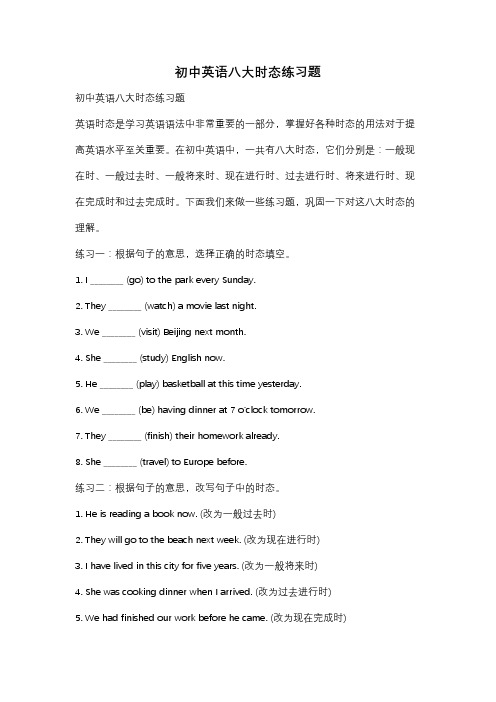
初中英语八大时态练习题初中英语八大时态练习题英语时态是学习英语语法中非常重要的一部分,掌握好各种时态的用法对于提高英语水平至关重要。
在初中英语中,一共有八大时态,它们分别是:一般现在时、一般过去时、一般将来时、现在进行时、过去进行时、将来进行时、现在完成时和过去完成时。
下面我们来做一些练习题,巩固一下对这八大时态的理解。
练习一:根据句子的意思,选择正确的时态填空。
1. I ________ (go) to the park every Sunday.2. They ________ (watch) a movie last night.3. We ________ (visit) Beijing next month.4. She ________ (study) English now.5. He ________ (play) basketball at this time yesterday.6. We ________ (be) having dinner at 7 o'clock tomorrow.7. They ________ (finish) their homework already.8. She ________ (travel) to Europe before.练习二:根据句子的意思,改写句子中的时态。
1. He is reading a book now. (改为一般过去时)2. They will go to the beach next week. (改为现在进行时)3. I have lived in this city for five years. (改为一般将来时)4. She was cooking dinner when I arrived. (改为过去进行时)5. We had finished our work before he came. (改为现在完成时)6. They have been studying English since morning. (改为过去完成时)7. He is going to the concert tomorrow. (改为将来进行时)8. I played soccer with my friends yesterday. (改为一般现在时)练习三:根据句子的意思,用正确的时态填空。
中考英语-八大时态的基本时态练习(含答案)
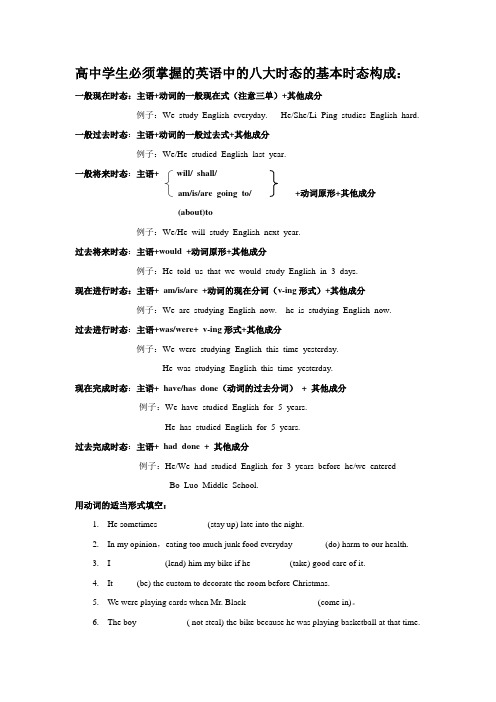
高中学生必须掌握的英语中的八大时态的基本时态构成:一般现在时态:主语+动词的一般现在式(注意三单)+其他成分例子:We study English everyday. He/She/Li Ping studies English hard. 一般过去时态:主语+动词的一般过去式+其他成分例子:We/He studied English last year.一般将来时态:主语+ will/ shall/am/is/are going to/ +动词原形+其他成分(about)to例子:We/He will study English next year.过去将来时态:主语+would +动词原形+其他成分例子:He told us that we would study English in 3 days.现在进行时态:主语+ am/is/are +动词的现在分词(v-ing形式)+其他成分例子:We are studying English now. he is studying English now.过去进行时态:主语+was/were+ v-ing形式+其他成分例子:We were studying English this time yesterday.He was studying English this time yesterday.现在完成时态:主语+ have/has done(动词的过去分词)+ 其他成分例子:We have studied English for 5 years.He has studied English for 5 years.过去完成时态:主语+ had done + 其他成分例子:He/We had studied English for 3 years before he/we enteredBo Luo Middle School.用动词的适当形式填空:1.He sometimes ___________(stay up) late into the night.2.In my opinion,eating too much junk food everyday _______(do) harm to our health.3.I ____________(lend) him my bike if he_________(take) good care of it.4.It _____(be) the custom to decorate the room before Christmas.5.We were playing cards when Mr. Black ________________(come in)。
初中英语语法:动词时态讲解及练习
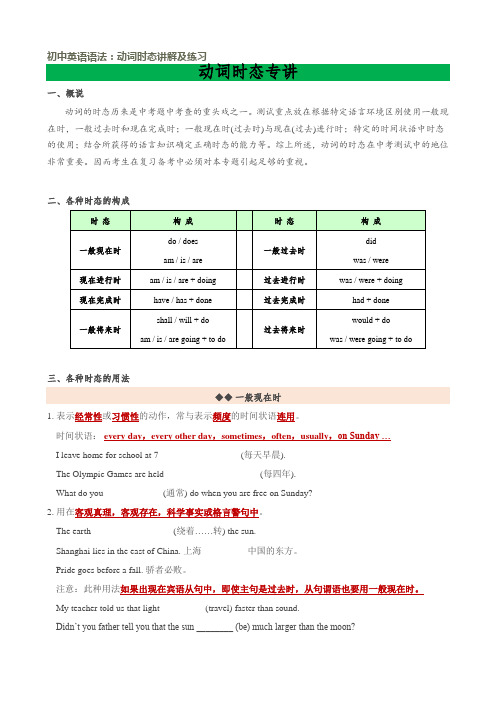
初中英语语法:动词时态讲解及练习动词时态专讲一、概说动词的时态历来是中考题中考查的重头戏之一。
测试重点放在根据特定语言环境区别使用一般现在时,一般过去时和现在完成时;一般现在时(过去时)与现在(过去)进行时;特定的时间状语中时态的使用;结合所获得的语言知识确定正确时态的能力等。
综上所述,动词的时态在中考测试中的地位非常重要。
因而考生在复习备考中必须对本专题引起足够的重视。
二、各种时态的构成三、各种时态的用法◆◆一般现在时1. 表示经常性或习惯性的动作,常与表示频度的时间状语连用。
时间状语:every day,every other day,sometimes,often,usually,on Sunday …I leave home for school at 7 _________________ (每天早晨).The Olympic Games are held ____________________ (每四年).What do you ____________ (通常) do when you are free on Sunday?2. 用在客观真理,客观存在,科学事实或格言警句中。
The earth _________________ (绕着……转) the sun.Shanghai lies in the east of China. 上海__________中国的东方。
Pride goes before a fall. 骄者必败。
注意:此种用法如果出现在宾语从句中,即使主句是过去时,从句谓语也要用一般现在时。
My teacher told us that light _________ (travel) faster than sound.Didn’t you father tell you that the sun ________ (be) much larger than the moon?3. 表示按计划表或时间表将要发生的动作,某些动词如come, go, move, stop, leave, finish, start等,在一般现在时态中可用来表示将来肯定会发生的动作。
动词八大时态用法以及练习总结精华(可编辑修改word版)

一般现在时态一、一般现在时的用法:1、表示经常或者反复发生的动作. 如: 我每天吃午饭. I have lunch every day.2、还表示现在存在的一种状态. 如:我姐姐是一位老师.My sister is a teacher.3、客观真理,客观存在,科学事实。
例如:The earth moves around the sun.地球绕着太阳转。
二、一般现在时态经常与often(经常)sometimes(有时)always(总是)usually (通常)等频率词连用,也经常与every day(每天), every week(每周), every month(每月), every term(每学期), every year(每年), once a week (一周一次),twice a year(一年两次)等表示时间的词连用。
三、第三人称单数问题一般现在时中,当主语是第三人称单数时,即常在动词原形后加-s 或-es。
四、一般现在时分类:1.一般现在时态分为be 动词的一般现在时。
1)be 动词包括am,is,are. 中文为"是",这三个词的用法要随着主语的变化而变化。
"am" 用于第一人称单数(I); "is" 用于第三人称单数(he,she,it); "are "用于第一人称复数(we),第二人称单数和复数(you), 第三人称复数(they)。
可以记住以下顺口溜:am 管"我",is 管",她,它,他",are 管"大家"。
一般疑问句和否定句:把be 动词"am,is,are" 放在句首,回答时也要使用be 动词;变为否定句时,把表示否定的not 放在"am is are" 的后面, 其中可以简写为:is not---- isn't ;are not---- aren't;am not 没有简写形式。
初中英语八大时态详解及专项训练(附答案)(期末复习资料)!
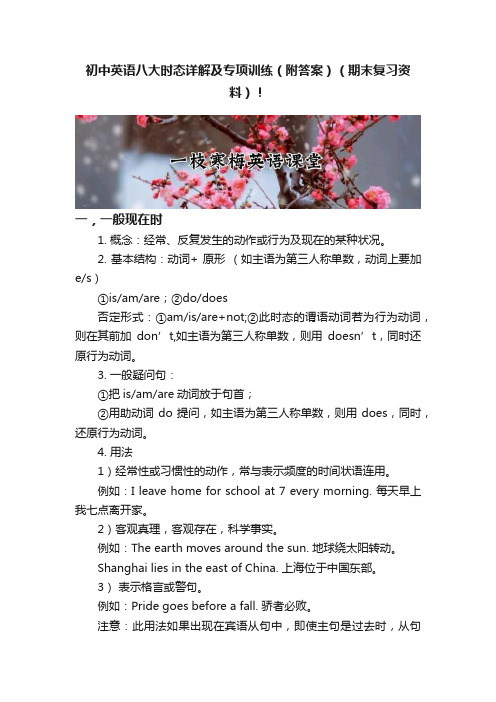
初中英语八大时态详解及专项训练(附答案)(期末复习资料)!一,一般现在时1. 概念:经常、反复发生的动作或行为及现在的某种状况。
2. 基本结构:动词+ 原形(如主语为第三人称单数,动词上要加e/s)①is/am/are;②do/does否定形式:①am/is/are+not;②此时态的谓语动词若为行为动词,则在其前加don’t,如主语为第三人称单数,则用doesn’t,同时还原行为动词。
3. 一般疑问句:①把is/am/are动词放于句首;②用助动词do提问,如主语为第三人称单数,则用does,同时,还原行为动词。
4. 用法1)经常性或习惯性的动作,常与表示频度的时间状语连用。
例如:I leave home for school at 7 every morning. 每天早上我七点离开家。
2)客观真理,客观存在,科学事实。
例如:The earth moves around the sun. 地球绕太阳转动。
Shanghai lies in the east of China. 上海位于中国东部。
3)表示格言或警句。
例如:Pride goes before a fall. 骄者必败。
注意:此用法如果出现在宾语从句中,即使主句是过去时,从句谓语也要用一般现在时。
例如:Columbus proved that the earth is round. 哥伦布证实了地球是圆的。
4)现在时刻的状态、能力、性格、个性。
例如:I don't want so much. 我不要那么多。
He writes good English but does not speak well.他英语写得不错,讲的可不行。
5)一般现在时表示将来含义。
a. 下列动词come, go, arrive, leave, start, begin, return的一般现在时可以表示将来,主要用来表示在时间上已确定或安排好的事情。
例如:The train leaves at six tomorrow morning. 火车明天上午六点开。
高考英语动词时态语态复习题附答案完整版.doc

(一)动词的时态时态动词是谓语动所表示的动作或情况发生时间的各种形式。
英语动词有16种时态,但是常用的只有9种:一般现在时、一般过去时、一般将来时、现在进行时、过去进行时、现在完成时、过去完成时、过去将来时、现在完成进行时。
下面分别介绍。
1、一般现在时的用法(do/does)1)表示经常性、习惯性的动作;表示现在的状态、特征和真理。
句中常用often, usually, every day, sometimes, every week/year, twice aweek 等时间状语。
例如:a. He goes to school every day.b. He is very happy.c.The earth moves around the sun.2) 在时间状语从句和条件状语从句中,用一般现在时表示将来。
例如:a. If you come this afternoon, we’ll have a meeting.b. When I graduate, I’ll go to countryside.3) 有时这个时态表示按计划、规定, 按时间表要发生的动作(句中都带有时间状语),但限于少数动词,如:begin, come, leave, go ,arrive, start , stop, return, open, close等。
例如:a.the meeting begins at seven.b.the rain starts at nine in the morning.4) 表示状态和感觉的动词(be, like, hate, think, remember, find, sound 等)常用一般现在进行时。
a.i like english very much.b.the story sound very interesting.5) 书报的标题、小说等情节介绍常用一般现在时。
2.一般过去时的用法(did)1)表示过去某时间发生的事、存在的状态或过反复发生的动作。
八大时态综合讲解及专项练习题共八页打印版

e.g We clean the room every day.
2.一般过去时:主语+did
e.g We cleaned the room just now.
3.现在进行时:主语+am/is/are doing
e.g We are cleaning the room now.
3.基本结构:be动词;行为动词
4.否定形式:was/were+not;在行为动词前加didn't,同时还原行为动词。
5.一般疑问句:was或were放于句首;用助动词do的过去式did提问,同时还原行为动词。
6.例句:She often came to help us in those days.
A. went swimming B. go swimming C. visited grandparents
一般过去时
一.用“am , is , was”填空
1. I _____ a teacher now. I _____ a student five years ago.
2. Where ______ it now?
6.例句:It seldom snows here.
He is always ready to help others.
Action speaks louder than words.
二、一般过去时:
1.概念:过去某个时间里发生的动作或状态;过去习惯性、经常性的动作、行为。
2.时间状语:ago, yesterday, the day before yesterday, last week(year, night, month…), in 1989, just now, at the age of 5, one day, long long ago, once upon a time, etc.
初中英语八大时态练习试题及答案(详解)
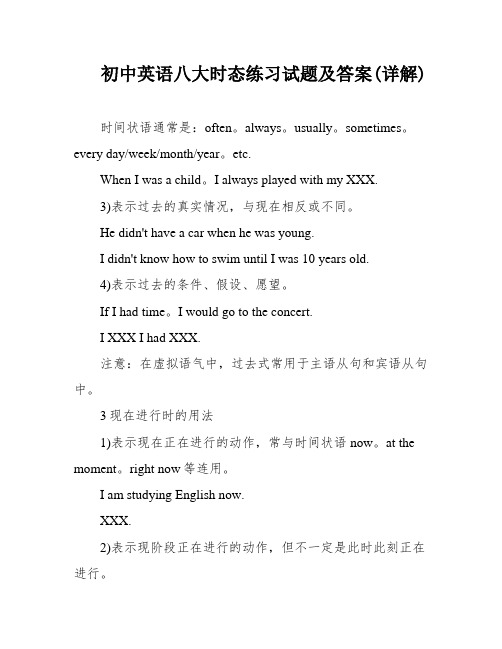
初中英语八大时态练习试题及答案(详解)时间状语通常是:often。
always。
usually。
sometimes。
every day/week/month/year。
etc.When I was a child。
I always played with my XXX.3)表示过去的真实情况,与现在相反或不同。
He didn't have a car when he was young.I didn't know how to swim until I was 10 years old.4)表示过去的条件、假设、愿望。
If I had time。
I would go to the concert.I XXX I had XXX.注意:在虚拟语气中,过去式常用于主语从句和宾语从句中。
3现在进行时的用法1)表示现在正在进行的动作,常与时间状语now。
at the moment。
right now等连用。
I am studying English now.XXX.2)表示现阶段正在进行的动作,但不一定是此时此刻正在进行。
He is learning Chinese this semester.XXX.注意:现在进行时表示的动作必须是正在进行的,而不是已经完成的或惯性的动作。
4过去进行时的用法1)表示过去某一时刻正在进行的动作。
I was watching TV when she called me.They were having dinner at 7 o'clock last night.2)表示过去某段时间内正在进行的动作。
I was XXX.He was working on the project for two weeks.注意:过去进行时强调的是动作的持续性和进行性,常与表示过去的时间状语连用。
5一般将来时的用法1)表示将来某一时刻要发生的动作或存在的状态。
I will go to the beach XXX.She will be 30 years old next month.2)表示将来经常性或惯性的动作。
(完整word版)八大时态综合讲解及专项练习题共八页 打印版范文

英语八大时态详解英语的时态(tense)是一种动词形式,不同的时态用以表示不同的时间与方式。
下面就英语中常见的八种基本时态进行阐述,其它的时态都是在这八种时态的基础上结合而成的。
一、一般现在时:1.概念:经常、反复发生的动作或行为及现在的某种状况。
2.时间状语:always, usually, often, sometimes, every week (day, year, month...), once a week, on Sundays,3.基本结构:动词原形(如主语为第三人称单数,动词上要加(e)S)4.否定形式:am/is/are+not;此时态的谓语动词若为行为动词,则在其前加don't,如主语为第三人称单数,则用doesn't,通常还原行为动词。
5.一般疑问句:把be动词放于句首;用助动词do提问,如主语为第三人称单数,则用does,同时,还原行为动词。
6.例句:It seldom snows here.He is always ready to help others.Action speaks louder than words.二、一般过去时:1.概念:过去某个时间里发生的动作或状态;过去习惯性、经常性的动作、行为。
2.时间状语:ago, yesterday, the day before yesterday, last week(year, night, month…), in 1989, just now, at the age of 5, one day, long long ago, once upon a time, etc.3.基本结构:be动词;行为动词4.否定形式:was/were+not;在行为动词前加didn't,同时还原行为动词。
5.一般疑问句:was或were放于句首;用助动词do的过去式did 提问,同时还原行为动词。
6.例句:She often came to help us in those days.I didn't know you were so busy.三、现在进行时:1.概念:表示现阶段或说话时正在进行的动作及行为。
八大时态及习题精修版

八大时态及习题精修版语法一:句子结构在英语中一个简单的完整的句子一般有五种结构1 主(S)+谓(V)这里的谓语一般都是不及物动词(略) eg:I come, I conquer2 主(S)+系动词(be)+表(P)主系表结构这个be叫系动词也叫be动词有am is are was were being been 这7种变化,目前只需要掌握am is are was were就足够了。
主语+系动词+形容词/名词做表语就叫做“主系表结构”主系表结构用来描述“状态”。
eg:I am your teacher, You are my students ,She is pretty ,He is fat 等等3 主(S)+谓(V)+宾(O)主谓宾结构,实义动词做谓语,后面跟宾语这种结构就叫“主谓宾结构”这两类的区别就是be动词后面跟表语另一个是谓语动词后面跟的是宾语。
主谓宾结构用来描述“动作”eg I teach you English you like playing pin pang4 主(S)+谓(V)+宾(O)+宾补(OC)略5 主(S)+谓(V)+间接宾语(IO)+直接宾语(DO)略动词的分类4类1:实意动词do:表示具有实际动作意义的词2:系动词be(am/is/are/was/were):联系动词用来连接主语和表语成分之间的词3:情态动词:表示说话人的情感,语气等,不可以直接充当谓语,必须跟实意动词共同承担谓语部分4:助动词:本身没有实际意义,必须和实意动词共同承担语法功能,起否定、疑问、或者说明句子的时态问题等情况下使用。
《时态总则》时态是指:“时”和“态”,?时是指动作发生的时间,?态是指动词的变化形态动作发生的时间(过去、现在、进行、将来),动词的形态(原形、单三、ing、ed)所以时态就是动词在不同时间段内形态的变化规则通过时态的定义我们可知,所有时态的学习重点不外乎三个1用法2 三大结构3 时间状语一般现在时一般现在时:表示经常反复发生、习惯性的动作或存在的状态(简单理解为每天会重复发生的动作或存在的状态)当表示“现阶段经常或习惯性发生的动作或存在的状态”,或者“客观规律事实或者科学真理”时,使用一般现在时.(标志词)时间状语always(总是)usually(通常)often(经常)never(从来都不)once a week(每周一次)everyday(每天)on Sunday (在周日),看到这些词时,时态首选一般现在时英语中做谓语的动词基本就两类:1.句子中有BE动词也就是系动词,构成主系表结构表示一种存在的状态。
(完整版)初中英语8种时态分类练习及答案

初中英语8种时态分类练习1.一般过去2.一般现在。
现在进行4一般将来5过去进行6现在完成7过去完成8过去将来一般过去时专练( )1. The mother asked the boy _______ down the ladder, but he went on _______ instead.A. come; climbingB. to come; to climbC. to come; climbingD. coming; climbing( )2. The teacher asked the students to close the windows _______ the wind from _______ the papers away.A. to stop; blowingB. stopping; blowingC. to stop; blowD. stopped; blow( )3. The sick man stayed in bed, _______ very terrible.A. feltB. feelingC. is feelingD. was feeling( )4. Yesterday I heard a story _______ by my friend.A. toldB. tellingC. to tellD. tell( )5. The boy was made _______ there for an hour by his father.A. standingB. standC. to standD. stands( )6. I saw him _______ into the small store.A. wentB. goingC. to goD. has gone( )7. He raised his voice to make everybody in the room ______ him clearly.A. hearB. to hearC. hearingD. heard( )8. Our geography teacher told us yesterday that the earth _______ around the sun.A. was movingB. movedC. has movedD. moves( )9. Oh, it’s you. I’m sorry I _______ know you _______ here.A. don’t; areB. didn’t; areC. didn’t; wereD. don’t; were( )10. Mr LuXun died in 1936. He _______ a lot of famous novels.A. wroteB. was writingC. has writtenD. would write( )11. --- How was your weekend on the farm?--- Great! We _______ with the farmers.A. enjoy ourselvesB. went fishingC. will workD. make friends( )12. --- What did Mr Jones do before he moved here?--- He _______ a city bus for over twenty-five years.A. is drivingB. droveC. has drivenD. drives( )13. Jane _______ a new dress every month when she was in Shanghai.A. buysB. is buyingC. boughtD. will buy( )14. --- Liu Mei can’t come tonight.--- Why? But she _______ me she would come.A. tellsB. toldC. is toldD. had told( )15. He turned off the light and then _______.A. leavesB. has leftC. will leaveD. left一般过去时专练1-5 CABAC 6-10 BADCA 11-15 BBCBD一般现在时与现在进行时专练( ) 1. Father usually ______ his newspaper after dinner.A. readB. readsC. readingD. is reading( ) 2. The Blacks often ______ to the cinema on Saturday evenings.A. goB. goesC. is goingD. are going( ) 3.Look! The boy ______ with his mother in the pool.A. is swimmingB. is swimmingC. are swimmingD. are swiming( ) 4.--- What is Tom doing in the classroom? --- He ______ something on the blackboard.A. drawsB. drawC. is drawingD. are drawing.( ) 5.Old Tom usually ______ up at six and ______ sports in the garden.A. gets, dosB. gets, doesC. get, doesD. gets, do( ) 6. It’s ten o’clock and Jack ______ still(仍然) ______ his homework.A. is, doB. is, doingC. are, doD. are, doing( ) 7. The waiters ______ to work at five every morning.A. startB. startsC. startingD. are starting( ) 8.I ______ a letter, so I can’t go out with you.A. is writingB. am writingC. am writeingD. am writting( )9.A hundred days _____ quite a long time.A. isB. areC. haveD. has( )10. --______ late for the meeting next time. –Sorry, I won’t.A. Don’tB. Don’t beC. Won’t beD. Be not( )11. My mother _____ noodles, but my father ______.A. likes, doesn’tB. don’t like, doC. likes, didn’tD. didn’t like, do( )12. The picture ______ nice.A. looksB. is lookedC. lookD. is looking( )13. The students will go to the Summer Palace if it ______ tomorrow.A. don’t rainB. doesn’t rainC. won’t rainD. isn’t rain( )14. We are always ready _______ others.A. to helpingB. to helpC. helpD. helping( )15. I often hear her ______ about the boy.A. talkingB. talkC. to talkD. talked( )16. He’s already a little weak in Chinese, ______ he ?A. isB. isn’tC. hasD. hasn’t( )17.Potatoes are ______ in the field by the farmers.A. growB. growingC. grownD. grew( )18. Does she have a watch? – Yes, she ______.A. haveB. doC. hasD. does( )19. She _____ English very much now.A. is likingB. likesC. likedD. is teaching( )20. She has no paper to _____ . Why not give her some?A. writeB. be writingC. write onD. write in()21. Does Mr Know-all know ______ keys?A. to makeB. how to makeC. how makeD. making( )22. Does your mother ______ English now?A. teachesB. teachC. taughtD. is teaching( )23. Jack usually ______ mistakes last term. But this term he does better.A. makesB. madeC. doesD. did( )24. The boy is too young, please ______ carefully.A. look after himB. look him afterC. look at himD. look him at( )25. She ______ you to come to my birthday party.A. hopesB. wishesC. wantD. lets( )26. --Where is Frank now? -- He ______ his bike in the yard.A. fixes upB. fixing upC. is fixing upD. fixed( )27. Bob often ______ his mother with the housework on Sundays.A. helpB. helpingC. helpsD. helped( )28. The students will go to the Summer Palace if it ______ tomorrow.A. don’t rainB. doesn’t rainC. won’t rainD. isn’t rain( )29. If it _____ tomorrow, I will go by car.A. rainB. will rainC. rainsD. would rain( )30. --What a nice garden! –She ______ it every day.A. is cleaningB. has cleanedC. cleansD. clean( )31. --Where is Peter? -- He ______ his homework in the room.A. is doingB. doesC. didD. do( )32. The teacher told us that light ______ much faster than sound.A. travelsB. traveledC. wasD. will be( )33. My mother told us that Taiwan ______ part of China.A. isB. areC. wasD. were( )34. Do you know bananas _____ in Hainan?A. growsB. is grownC. grewD. are grown( )35. The clothes ______very soft.A. are feltB. are feelingC. feelD. feels( )36. The supermarket is far from Mary’s house. So she _____ only once a week.A. goes shoppingB. has been thereC. was shoppingD. has gone there ( )37. Don’t make so much noise. We _____ to the music.A. are listeningB. listenC. listenedD. have listened( )38. I’ll go swimming with you if I _____ free tomorrow.A. will beB. shall beC. amD. was( )39. – Oh, Mrs. King, your sweater looks nice. Is it _____ wool ?-- Yes, and it’s _____ Inner Mongolia.A. made of, made byB. made of, made inC. made by, made forD. made by, made from一般现在时与现在进行时专练1-5BAACB 6-10BABAB 11-15AABBB 16-20 BCDBC21-25 BBBAC 26-30 CCBAC 31-35 AAABC 36-39 AACB3.一般将来时专练( )1. Her hope _______ the 2008 Olympic Games.A. to take part inB. is to take part inC. taking part inD. will take part in ( )2. --- Can I go to Beijing for my holiday, Dad? --- You can when you _______ a bit older.A. will getB. getC. are gettingD. got( )3. If he _______harder, he will catch up with us soon.A. studyB. studiesC. will studyD. studied( )4. --- Don’t forget to ask him to write to me.--- I won’t. As soon as he _______, I’ll ask him to write to you.A. will comeB. cameC. comesD. is coming( )5. --- Jimmy is leaving for a holiday.--- Really? Where _______ he _______?A. has; goneB. will; goC. did; goD. would; go( )6. Frank _______ to see his grandma if he _______ free tomorrow.A. will come; will beB. comes; isC. will come; isD. comes; will be( )7. There _______ a talk on science in our school next Monday.A. will giveB. will beC. is going to giveD. is( )8. --- Shall we go shopping now?--- Sorry, I can’t. I _______ my shirts.A. washB. washesC. washedD. am washing( )9. I believe that those mountains _______ with trees in a few years’ time.A. are coveredB. will be coveredC. are coveringD. will cover( )10. It is said that about 400 cars _______ in the factory next month.A. were producedB. will produceC. are producedD. will be produced( )11. --- Are you free this afternoon?--- No. I’ll have an English composition _______ this afternoon.A. to writeB. wroteC. to be writingD. to be written( )12. --- Come back home every month.--- I _______.A. willB. mustC. shouldD. can( )13. A robot _______ think of itself; it _______ be told what to do.A. can’t; mustB. couldn’t; canC. may not; willD. mustn’t, may一般将来时专练1-5 BBBCB 6-10 CBDBD 11-13 AAA4.过去进行时专练二、用动词的适当形式填空。
初中英语八大时态讲解及练习(含答案)
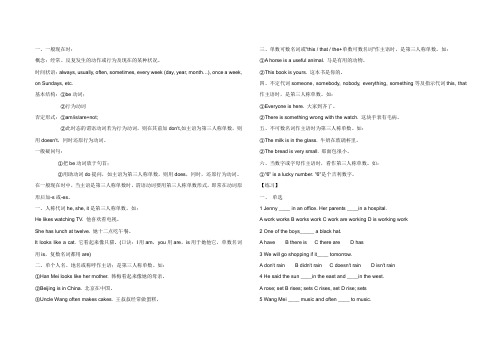
一、一般现在时:概念:经常、反复发生的动作或行为及现在的某种状况。
时间状语:always, usually, often, sometimes, every week (day, year, month…), once a week, on Sundays, etc.基本结构:①be动词;②行为动词否定形式:①am/is/are+not;②此时态的谓语动词若为行为动词,则在其前加don't,如主语为第三人称单数,则用doesn't,同时还原行为动词。
一般疑问句:①把be动词放于句首;②用助动词do提问,如主语为第三人称单数,则用does,同时,还原行为动词。
在一般现在时中,当主语是第三人称单数时,谓语动词要用第三人称单数形式,即常在动词原形后加-s或-es。
一、人称代词he, she, it是第三人称单数。
如:He likes watching TV. 他喜欢看电视。
She has lunch at twelve. 她十二点吃午餐。
It looks like a cat. 它看起来像只猫。
(口诀:I用am,you用are,is用于她他它,单数名词用is,复数名词都用are)二、单个人名、地名或称呼作主语;是第三人称单数。
如:①Han Mei looks like her mother. 韩梅看起来像她的母亲。
②Beijing is in China. 北京在中国。
③Uncle Wang often makes cakes. 王叔叔经常做蛋糕。
三、单数可数名词或"this / that / the+单数可数名词"作主语时,是第三人称单数。
如:①A horse is a useful animal. 马是有用的动物。
②This book is yours. 这本书是你的。
四、不定代词someone, somebody, nobody, everything, something等及指示代词this, that 作主语时,是第三人称单数。
初中英语8种时态练习及答案五篇

初中英语8种时态练习及答案五篇第一篇:初中英语8种时态练习及答案初中英语8种时态练习1.The mother asked the boy _______ down the ladder, but he went on _______ e;climbingB.to come;to climbC.to come;climbinging;climbing2.Yesterday I heard a story _______ by my friend.A.toldB.tellingC.to tellD.Tell3.Father usually ______ his newspaper after dinner.A.readB.readsC.readingD.is reading4.Look!The boy ______ with his mother in the pool.A.is swimmingB.is swimmingC.are swimmingD.are swimming5.The picture ______ nice.A.looksB.is lookedC.lookD.is looking6.--What a nice garden!–She ______ it every day.A.is cleaningB.has cleanedC.cleansD.clean7.--Where is Frank now?--He ______ his bike in the yard.A.fixes upB.fixing upC.is fixing upD.fixed8.If he _______harder, he will catch up with us soon.A.studyB.studiesC.will studyD.studied9.---Jimmy is leaving for a holiday.---Really? Where _______ he _______?A.has;goneB.will;goC.did;goD.would;go10.How long have you _______ here?eB.gotC.arrivedD.been11.The Smiths _______ in China for 8 years.A.has livedB.livedC.have beenD.live12.--Do you know Lydia very well?--Yes, She and I _____ friends since we were very young.A.have madeB.have becomeC.have beenD.have turned13.It seems that the old man _________something important.A.has lostB.had lostC.lostD.would lose14.We _________the work by six yesterday evening.A.finishedB.would finishC.had finishedD.had been finished15.When I reached home, my parents __________their supper.A.are havingB.have already hadC.have hadD.had already had第二篇:初中英语时态练习题及答案英语五大时态练习题(一般现在、一般过去、过去将来、现在进行、现在完成)1.You ________about the future now, ________you? A.don't think, don't B.aren't thinking, aren't C.don't think, do D.aren't thinking, are2.Charlie____here next month.A.isn’t working B.doesn’t working C.isn’t going to working D.won’t work3.—Did the thieves _____ into the car? —No, they______.A.fell, didn’t B.fall(落下), did C.jump(跳), didn’t D.jump, did4.____ she _____ this dictionary in the bookshop nearby last week? A.Did, buy B.Does, buy C.Did, bought D.Does, buys5.How ________ ____ Mr.Brown ___________ to America? A.do,go B.is,go C.does,go D.does,goes6.-When did May come back from Hong Kong?-She _D_ from Hong Kong last e back es back C.returned back D.came back7.There____a meeting tomorrow afternoon.A.will be going to B.will going to be C.is going to be D.will go to be8.-Mum, may I go out and play basketball?-____ __you______ your homework yet? A.Do;finish B.Are;finishingC.Did;finishD.Have;finished9.He_____very busy this week,he______free next week.A.will be;is B.is;is C.will be;will be D.is;will be 10.---Is your father a doctor?---Yes, he is.He ______ in T own Hospital.A.has worked B.isworking C.wor ks D.worked 11.Where’s my camera? I___________ it.A.am not finding B.am not seeing C.can’t find D.can’t look at 12.—____he ____ his lunch? —Yes, he did.A.Does ,has B.Does, have C.Did, have D.Did, had 13.Where is the morning paper?–I______if for you at once.A.get B.am getting C.to get D.will get14.Physics _____ much harder than English, I think.A.are B.is C.wasD.were 15.How __________ he go to work? He ___________ to work by bike A.does go B.do;goes C.do go D.does;goes 16.-Have you ever______Lintong to see the Terra Cotta Warriors?-Yes, I have.A.went to B.gone to C.been in D.been to 17.Look.they _________ a good time, _________ they? A.have, do B.have, don't C.are having, are D.are having, aren't 18.There____a dolphin show in the zoo tomorrow evening.A.was B.is going to have C.will haveD.is going to be19.Mr.Yang ________ English this term.A.teaches our B.teaches us C.teachs us D.teach our 20.–_______you_______free tomorrow?–No.I________free the day after tomorrow.A.Are;going to;will B.Are;going to be;will C.Are;going to;will be D.Are;going to be;will be 21.I_____a letter from him since he left.A.didn't receive B.haven't got C.didn't have D.haven't heard 22.Listen!They _______ in the next room.A.sing B.is singing C.are singing D.were singing 23.—What _____ you _______ last week? —I bought a bag.A.did ,buy B.did , bought C.do, buy D.do, bought 24.My parents ______ Shangdong for ten years.A.have been in B.have been to C.have gone to D.have been 25.______ you usually late for school? No, _____________.A.Do I am B.Does not C.Are I’m not D.Are I aren’t 26.---Mary, could you help me?---Wait a moment.I ____.A.read a book B.did my homework C.was watching TV D.am cooking dinner.27.–Shall I buy a cup of tea for you?–____.(不,不要。
初中英语八大时态练习(免费)
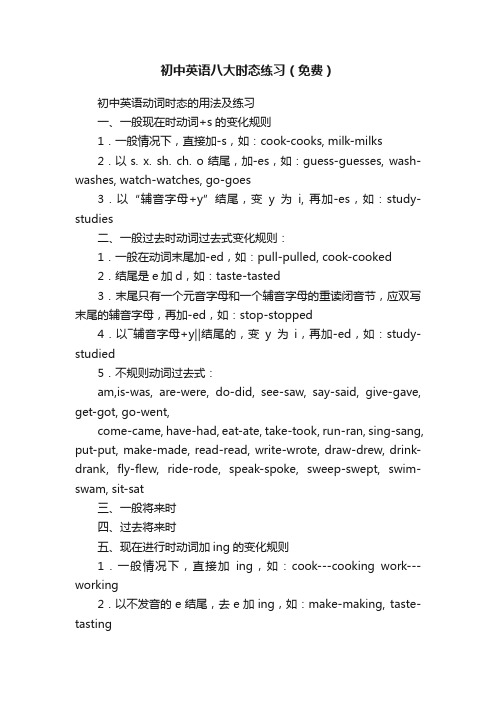
初中英语八大时态练习(免费)初中英语动词时态的用法及练习一、一般现在时动词+s的变化规则1.一般情况下,直接加-s,如:cook-cooks, milk-milks2.以s. x. sh. ch. o结尾,加-es,如:guess-guesses, wash-washes, watch-watches, go-goes3.以“辅音字母+y”结尾,变y为i, 再加-es,如:study-studies二、一般过去时动词过去式变化规则:1.一般在动词末尾加-ed,如:pull-pulled, cook-cooked2.结尾是e加d,如:taste-tasted3.末尾只有一个元音字母和一个辅音字母的重读闭音节,应双写末尾的辅音字母,再加-ed,如:stop-stopped4.以―辅音字母+y‖结尾的,变y为i,再加-ed,如:study-studied5.不规则动词过去式:am,is-was, are-were, do-did, see-saw, say-said, give-gave, get-got, go-went,come-came, have-had, eat-ate, take-took, run-ran, sing-sang, put-put, make-made, read-read, write-wrote, draw-drew, drink-drank, fly-flew, ride-rode, speak-spoke, sweep-swept, swim-swam, sit-sat三、一般将来时四、过去将来时五、现在进行时动词加ing的变化规则1.一般情况下,直接加ing,如:cook---cooking work---working2.以不发音的e结尾,去e加ing,如:make-making, taste-tasting3.如果末尾是一个元音字母和一个辅音字母,双写末尾的辅音字母,再加ing,如:run-running, stop-stopping六、过去进行时:七、现在完成时八、过去完成时一、写出下列动词的第三人称单数drink________go____________stay____________make__________loo k________ ____have____________pass__________ carry _________come___________ watch___________ plant_____________ fly ___________study___________ brush____________二、写出下列动词的过去式及过去分词is,am_________ fly_______ plant________ are ________drink_________play_______ go________ make ________ does_________ dance________worry________ ask _____taste_________ eat__________ draw________ put______ throw________ kick_________ pass_______ do ________三、写出下列动词的现在分词:play________run__________swim_________make__________go_____ ____like________write________ski___________read__________have_________sing ______dance_________put_________see________begin________shop________ ___ buy________ love____________ live_______ take_________ come ________ get_________stop_________ sit ________四、用括号内动词的适当形式填空。
英语动词的时态试题分类汇编含答案解析百度文库

英语动词的时态试题分类汇编含答案解析百度文库一、初中英语动词的时态1.(题文)—If you try hard, your dream will_______.—Yes, I____.A.come true; will B.be truly; willC.come true; do D.be true; do【答案】A【解析】句意:--如果你努力,你的梦想将实现。
--是的,我会的。
根据题干-If you try hard,your dream will_______.Yes,l____.可知从句是一般现在时,主句用一般将来时,所以 will 后面接动词原形come true,意为"实现";所以回答用will.即如果你努力,你的梦想将实现。
--是的,我会的。
故选A.2.I think I _ my new project tomorrow.A.start B.started C.will start D.was starting【答案】C【解析】句意:我想我明天将要开始我的新项目。
本题考查动词的时态。
A. start 开始,是动词原形 B. started 开始,是动词的过去式 C. will start 将要开始,是动词的将来时 D. was starting就要开始,是过去将来时。
根据句意选C。
3.I don’t know when you ______ to Mary’s party. When you go, ______as wellA.go ; I will go B.will go ; I will go C.will go ; I go D.go ; I go【答案】B【解析】句意:我不知道你什么时候去参加玛丽的聚会。
当你去的时候,我也去。
第一个空是考查宾语从句,主句I don’t know是一般现在时态,其宾语从句可以根据实际情况用任何时态,本题“我不知道你什么时候去参加玛丽的聚会”,“去”的动作属于没有发生,所以选择将来时态最佳,故排除A、D选项;第二个空When you go,是一个时间状语从句,而且这个时间对于说话时是一个没有发生没有到来的时间,也就暗示了后面主句用一般将来时,即当你去的时候我将和你一起去,表示去的动作还没有发生,所以主句用一般将来时,构成“主将从现”,故排除C选项;故答案选B。
